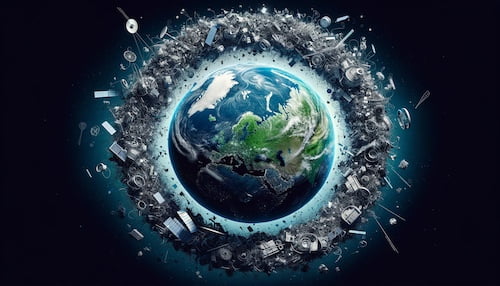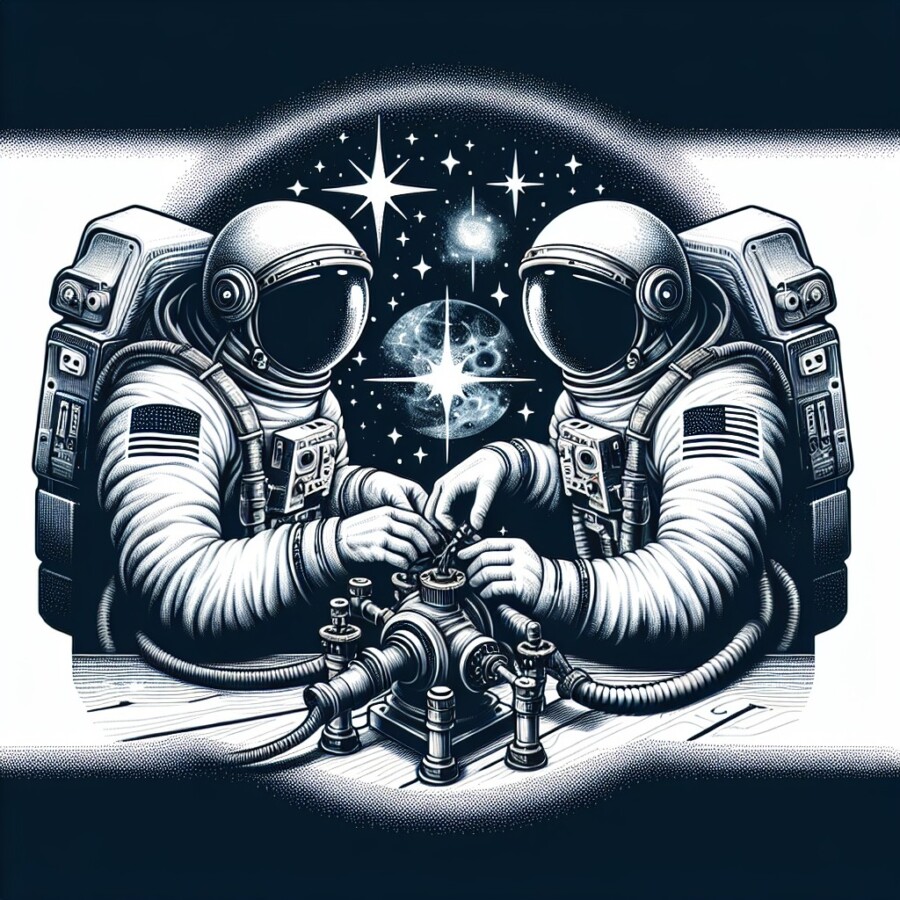The US government has given a company called Dish Network a fine for leaving space junk in orbit around the Earth. This is the first time the government has done this. Dish Network has to pay $150,000 because they didn’t move an old satellite far enough away from other satellites that are still being used. Space junk is made up of old satellites and parts of spacecraft that aren’t being used anymore. It’s a problem because it could crash into other satellites and cause damage. The government says Dish Network’s satellite could have caused a crash.
Dish Network’s satellite, called EchoStar-7, was launched in 2002 and was supposed to be moved further away from Earth. But by 2022, it had only been moved a little bit because it ran out of fuel. The government says it’s important for satellite operators to follow the rules because there are more and more satellites in space now. The $150,000 fine is not a lot of money for Dish Network, but it shows that the government has the power to enforce the rules.
A scientist named Dr. Megan Argo thinks that this fine will make other companies pay attention. There are a lot of things flying around in space, and if they crash into each other, it can cause a lot of damage. There have been over 10,000 satellites launched into space since 1957, and more than half of them are not being used anymore. NASA says there are over 25,000 pieces of space junk that are bigger than 10cm. Even something as small as a paint chip can be dangerous if it’s moving really fast in space. The government wants everyone to follow the rules and keep space clean.
Original news source: US issues first ever fine for space junk to Dish Network (BBC)
Listen
Slow
Normal
Fast
Group or Classroom Activities
Warm-up Activities:
– News Summary
Instructions: In pairs, students will read the article and write a summary of the key points in their own words. They should focus on the main idea, supporting details, and any important vocabulary. After they finish, they can compare their summaries with a partner and discuss any differences or questions they have.
– Opinion Poll
Instructions: In small groups, students will discuss their opinions on the topic of space junk and satellite regulations. They should consider questions such as: Should companies be fined for leaving space junk? What are the potential risks of space junk? Should there be stricter regulations for satellite operators? After discussing, each group will choose a spokesperson to share their group’s opinions with the class.
– Vocabulary Pictionary
Instructions: Each student will choose 5-10 key vocabulary words from the article. They will then draw a picture to represent each word without using any letters or numbers. After they finish, they can take turns showing their drawings to a partner who will try to guess the word. They can also explain the meaning of the word and its relevance to the article.
– Speed Summarizing
Instructions: In pairs, students will take turns summarizing the article in one minute or less. The goal is to practice speaking fluently and concisely while still conveying the main ideas of the article. After each round, students can switch partners and try again to improve their speed and accuracy.
– Pros and Cons
Instructions: In small groups, students will create a list of pros and cons for the government’s decision to fine Dish Network for leaving space junk. They should consider both the positive and negative aspects of the decision and discuss the potential impact on satellite operators and space cleanliness. After discussing, each group will choose a spokesperson to present their list to the class.
Comprehension Questions:
1. What did Dish Network do to receive a fine from the US government?
2. Why is space junk a problem?
3. How long has Dish Network’s satellite, EchoStar-7, been in orbit?
4. Why was EchoStar-7 not moved further away from Earth?
5. Why is it important for satellite operators to follow the rules?
6. How many satellites have been launched into space since 1957?
7. How many pieces of space junk that are bigger than 10cm are there according to NASA?
8. Why does the government want everyone to follow the rules and keep space clean?
Go to answers ⇩
Listen and Fill in the Gaps:
The US (1)______ has given a company called Dish (2)______ a fine for leaving (3)______ junk in orbit around the Earth. This is the first time the government has done this. Dish Network has to pay $150,000 because they didn’t move an old satellite far enough away from other satellites that are still being used. (4)______ junk is made up of old satellites and parts of spacecraft that aren’t being used anymore. It’s a problem because it could crash into other (5)______s and cause damage. The government says Dish Network’s satellite could have caused a crash.
Dish Network’s satellite, called EchoStar-7, was launched in 2002 and was supposed to be moved further away from (7)______. But by 2022, it had only been moved a little bit because it ran out of fuel. The government says it’s (8)______ for satellite operators to follow the rules because there are more and more satellites in space now. The $150,000 fine is not a lot of money for Dish Network, but it shows that the government has the power to enforce the rules.
A scientist (9)______ Dr. (10)______ Argo thinks that this fine will make (11)______ companies pay attention. There are a lot of (12)______ flying around in space, and if they crash into each other, it can cause a lot of (13)______. There have been over 10,000 satellites launched into space since 1957, and more than half of them are not being used anymore. NASA says there are over 25,000 pieces of space junk that are (14)______ than 10cm. Even something as (15)______ as a paint chip can be dangerous if it’s moving really fast in space. The government wants everyone to (16)______ the rules and keep space clean.
Go to answers ⇩
Discussion Questions:
Students can ask a partner these questions, or discuss them as a group.
1. What is space junk and why is it a problem?
2. How would you feel if you were a satellite operator and had to pay a fine for leaving space junk in orbit?
3. Do you think it’s important for satellite operators to follow the rules? Why or why not?
4. What do you think would happen if space junk crashed into other satellites?
5. How do you think the government can enforce the rules for satellite operators?
6. Do you think the $150,000 fine is enough punishment for Dish Network? Why or why not?
7. What do you think would happen if there were more crashes between space junk and satellites?
8. Have you ever heard of any other companies or organizations being fined for leaving space junk in orbit?
9. How do you think companies can prevent space junk from causing damage to other satellites?
10. Do you think there should be stricter regulations for satellite operators to prevent space junk? Why or why not?
11. What do you think would happen if there were no regulations for satellite operators?
12. How do you think scientists and engineers can clean up space junk?
13. Do you think it’s possible to completely clean up space junk? Why or why not?
14. How do you think the presence of space junk affects future space exploration?
15. What do you think individuals can do to help keep space clean?
Individual Activities
Vocabulary Meanings:
Match each word to its meaning.
Words:
1. government
2. fine
3. satellite
4. space junk
5. crash
6. rules
7. damage
8. clean
Meanings:
(a) Harm or injury to something
(b) The things you have to follow to stay safe and fair
(c) The people who make and enforce laws
(d) When two things hit each other with force
(e) Money that you have to pay as a punishment
(f) To keep something free from dirt or pollution
(g) Old satellites and parts of spacecraft that aren’t used anymore
(h) An object that orbits the Earth and sends signals
Go to answers ⇩
Multiple Choice Questions:
1. What is space junk?
(a) Old satellites and parts of spacecraft that are no longer being used
(b) New satellites and spacecraft that are currently being used
(c) Pieces of debris from meteor showers
(d) Alien spaceships that have crashed on Earth
2. Why did Dish Network receive a fine?
(a) They launched a new satellite without permission
(b) They didn’t pay their taxes on time
(c) They caused a crash between two satellites
(d) They didn’t move their old satellite far enough away from other satellites
3. How much does Dish Network have to pay as a fine?
(a) $1,000,000
(b) $150,000
(c) $500,000
(d) $50,000
4. Why is space junk a problem?
(a) It can be mistaken for alien spaceships
(b) It can block signals from reaching Earth
(c) It can crash into other satellites and cause damage
(d) It can be used by hackers to spy on other countries
5. When was Dish Network’s satellite, EchoStar-7, launched?
(a) 1999
(b) 2010
(c) 1985
(d) 2002
6. Why was EchoStar-7 not moved further away from Earth?
(a) Dish Network forgot about it
(b) The government didn’t give permission to move it
(c) It ran out of fuel
(d) It was too expensive to move it
7. How many pieces of space junk are bigger than 10cm?
(a) Over 10,000
(b) Over 25,000
(c) Over 5,000
(d) Over 50,000
8. What does the government want everyone to do?
(a) Follow the rules and keep space clean
(b) Launch more satellites into space
(c) Ignore the rules and create more space junk
(d) Stop using satellites altogether
Go to answers ⇩
True or False Questions:
1. Space junk consists of old satellites and unused spacecraft parts.
2. Dish Network has been awarded $150,000 for not moving an old satellite far enough away from other satellites still in use.
3. Space junk is not a problem because it cannot collide with other satellites and cause damage.
4. The government emphasizes the importance of satellite operators following the rules due to the increasing number of satellites in space.
5. Dish Network’s satellite, EchoStar-7, was launched in 2002 and was not supposed to be moved further away from Earth.
6. The $150,000 fine may serve as a deterrent for other companies and demonstrate the government’s ability to enforce regulations.
7. The US government has rewarded Dish Network for leaving space junk in orbit around the Earth.
8. This is the first time the government has imposed such a fine.
Go to answers ⇩
Write a Summary:
Write a summary of this news article in two sentences.
Check your writing now with the best free AI for English writing!
Writing Questions:
Answer the following questions. Write as much as you can for each answer.
Check your answers with our free English writing assistant!
1. Why did the US government give Dish Network a fine?
2. What is space junk and why is it a problem?
3. Why was Dish Network’s satellite not moved further away from Earth?
4. What does the government want satellite operators to do?
5. Why is it important for everyone to follow the rules and keep space clean?
Answers
Comprehension Question Answers:
1. What did Dish Network do to receive a fine from the US government?
Dish Network left space junk in orbit around the Earth and didn’t move their old satellite far enough away from other satellites.
2. Why is space junk a problem?
Space junk is a problem because it can crash into other satellites and cause damage.
3. How long has Dish Network’s satellite, EchoStar-7, been in orbit?
EchoStar-7 has been in orbit since 2002.
4. Why was EchoStar-7 not moved further away from Earth?
EchoStar-7 was not moved further away from Earth because it ran out of fuel.
5. Why is it important for satellite operators to follow the rules?
It is important for satellite operators to follow the rules because there are more and more satellites in space now, and not following the rules can lead to collisions and damage.
6. How many satellites have been launched into space since 1957?
Over 10,000 satellites have been launched into space since 1957.
7. How many pieces of space junk that are bigger than 10cm are there according to NASA?
According to NASA, there are over 25,000 pieces of space junk that are bigger than 10cm.
8. Why does the government want everyone to follow the rules and keep space clean?
The government wants everyone to follow the rules and keep space clean because space junk can cause damage and collisions, and it’s important to ensure the safety and sustainability of space exploration and satellite operations.
Go back to questions ⇧
Listen and Fill in the Gaps Answers:
(1) government
(2) Network
(3) space
(4) Space
(5) satellite
(6) satellites
(7) Earth
(8) important
(9) named
(10) Megan
(11) other
(12) things
(13) damage
(14) bigger
(15) small
(16) follow
Go back to questions ⇧
Vocabulary Meanings Answers:
1. government
Answer: (c) The people who make and enforce laws
2. fine
Answer: (e) Money that you have to pay as a punishment
3. satellite
Answer: (h) An object that orbits the Earth and sends signals
4. space junk
Answer: (g) Old satellites and parts of spacecraft that aren’t used anymore
5. crash
Answer: (d) When two things hit each other with force
6. rules
Answer: (b) The things you have to follow to stay safe and fair
7. damage
Answer: (a) Harm or injury to something
8. clean
Answer: (f) To keep something free from dirt or pollution
Go back to questions ⇧
Multiple Choice Answers:
1. What is space junk?
Answer: (a) Old satellites and parts of spacecraft that are no longer being used
2. Why did Dish Network receive a fine?
Answer: (d) They didn’t move their old satellite far enough away from other satellites
3. How much does Dish Network have to pay as a fine?
Answer: (b) $150,000
4. Why is space junk a problem?
Answer: (c) It can crash into other satellites and cause damage
5. When was Dish Network’s satellite, EchoStar-7, launched?
Answer: (d) 2002
6. Why was EchoStar-7 not moved further away from Earth?
Answer: (c) It ran out of fuel
7. How many pieces of space junk are bigger than 10cm?
Answer: (b) Over 25,000
8. What does the government want everyone to do?
Answer: (a) Follow the rules and keep space clean
Go back to questions ⇧
True or False Answers:
1. Space junk consists of old satellites and unused spacecraft parts. (Answer: True)
2. Dish Network has been awarded $150,000 for not moving an old satellite far enough away from other satellites still in use. (Answer: False)
3. Space junk is not a problem because it cannot collide with other satellites and cause damage. (Answer: False)
4. The government emphasizes the importance of satellite operators following the rules due to the increasing number of satellites in space. (Answer: True)
5. Dish Network’s satellite, EchoStar-7, was launched in 2002 and was not supposed to be moved further away from Earth. (Answer: False)
6. The $150,000 fine may serve as a deterrent for other companies and demonstrate the government’s ability to enforce regulations. (Answer: True)
7. The US government has rewarded Dish Network for leaving space junk in orbit around the Earth. (Answer: False)
8. This is the first time the government has imposed such a fine. (Answer: True)
Go back to questions ⇧













